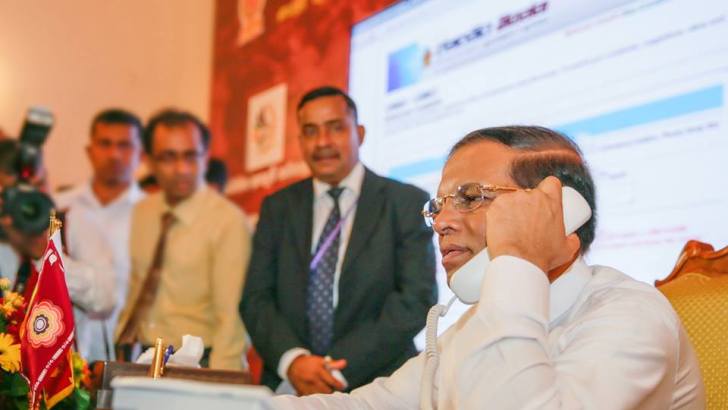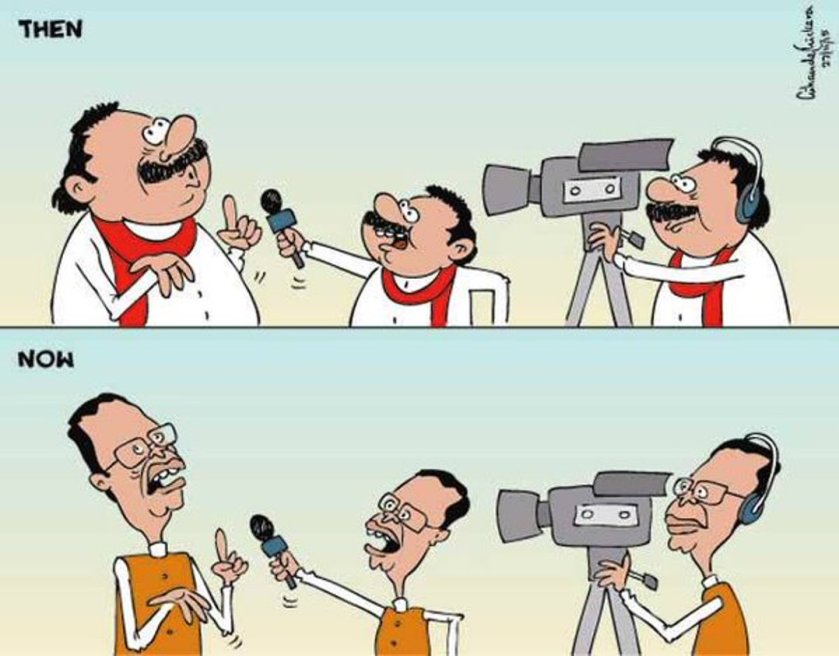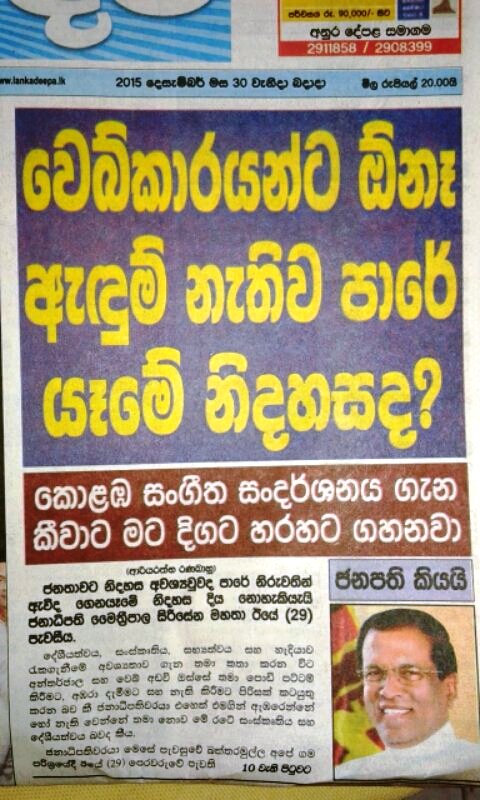In this week’s Ravaya column (appearing in issue of 17 January 2016), I critique the public communications practices President Maithripala Sirisena of Sri Lanka – and call for better listening and more engagement by the head of state.
I point out that Sirisena is in danger of overexposure in the mainstream media, which I call the ‘Premadasa Syndrome’ (as this bad practice was started by President R Premadasa who was in office from 1988 to May 1993). I argue that citizens don’t need to be force-fed a daily dose of presidential activities on prime time news or in the next day’s newspapers. If public documentation is needed, use the official website.
Like other politicians in Sri Lanka, Sirisena uses key social media platforms like Facebook and Twitter to simply disseminate his speeches, messages and photos. But his official website has no space for citizens to comment. That is old school broadcasting, not engaging.
This apparent aloofness, and the fact that he has not done a single Twitter/Facebook Q&A session before or after the election, detracts from his image as a consultative political leader.
On the whole, I would far prefer to see a more engaged (yet far less preachy!) presidency. It would be great to have our First Citizen using mainstream media as well as new media platforms to have regular conversations with the rest of us citizens on matters of public interest. A growing number of modern democratic rulers prefer informal citizen engagement without protocol or pomposity. President Sirisena is not yet among them.
See my English essay which covers similar ground: Yahapalanaya at One: When will our leaders ‘walk the talk’? Groundviews.org, 4 January 2016

ජනාධිපති මෛත්රීපාල සිරිසේනගේ පදවි ප්රාප්තියේ ප්රථම සංවත්සරය යෙදුණු 2016 ජනවාරි 9 වනදා ජනපතිට කියන්න නම් නව සේවාව ඇරඹුණා.
තැපැල් පෙට්ටි අංක 123 වෙත යොමු කරන ලියුමක් හරහාත්, දුරකථන අංක 1919 හරහාත් ජනතාවට සිය ප්රශ්න හා ගැටලූ ඉදිරිපත් කළ හැකි බවයි මේ සේවය හඳුන්වා දෙමින් කියැවුණේ. එයට අමතරව ජනපතිගේ නිල වෙබ් අඩවියත් (http://tell.president.gov.lk/), ජංගම දුරකථන ඇප් එකක් හරහාත් විමසීම් හා පැමිණිලි යොමු කළ හැකියි.
මෙය හොඳ අරමුණකින් කරන උත්සාහයක්. ගාල්ලෙන් බිහි වූ දක්ෂ මාධ්යවේදියකු වන සජීව විජේවීරත් මෙයට සම්බන්ධයි. ‘යහපාලනයේදී ජනාධිපතිවරයා තනි නොකරමු’ යයි කියමින් තමන් මෙයට දායක වූ සැටි ගැන ඔහුගේ ෆේස්බුක් එකෙන් ගිය සතියේ කෙටි විස්තරයක් පළ කර තිබුණා.
යහපාලන රජයේ මහජන සන්නිවේදන පිළිවෙත් හා ක්රියාකලාපය ඇගැයීමකට ලක් කරන්නට මෙය හොඳ අවස්ථාවක් යයි මා සිතනවා.
යහපාලනයේ මොන අඩුපාඩු හා විසමතා තිබුණත් භාෂණ නිදහස හා ප්රකාශන නිදහස නම් අපට ලැබී තිබෙනවා. එහි ප්රතිඵලයක් ලෙස අද අපට රටේ ජනපති හා අගමැති දෙපළත්, ඇමතිවරුනුත් නොබියව විවේචනය කළ හැකියි.
මේ නිදහස ගෙවි ගිය වසර පුරා මා ප්රායෝගිකව අත්හදා බැලූවා. රටේ නායකයන් දෙපළ හේතු සහගතව හා කිසිදු දේශපාලන මතවාදී එල්බ ගැනීමකින් තොරව විවේචනය කිරීමට යළිත් හැකි වීම ඉතා වැදගත්.
එහෙත් නායකයන් පොදු අවකාශයේ කැරෙන විවේචන හා වෙනත් අදහස් පළ කිරීම්වලට සංවේදීද? ඔවුන් මේවා ගැන අවධානයෙන් සිටිනවාද? ඔවුන්ගේ කාර්යමණ්ඩල රටවැසියන්ගේ සිතුම් පැතුම් ගැන නිවැරදි ප්රතිශෝෂණයක් ජනපති හා අගමැති දෙපළට ලබා දෙනවාද?
යහපාලනයේ වසරක් ගෙවී ගියද මේවාට පිළිතුරු හරිහැටි පැහැදිලි නැහැ.
රටේ ජනපතිවරයා රටවැසියා සමග සන්නිවේදනය කරන සැටි මා කලෙක සිට අධ්යයනය කරනවා. සිරිසේන ජනපතිගේ සන්නිවේදන රටා මේ වන විට පැහැදිලියි.
සිරිසේනගේ මැතිවරණ ප්රකාශයේ (දෙසැම්බර් 2014) 62 වන පිටුවේ මෙසේද සඳහන් වනවා. ‘දියුණු වන සන්නිවේදන තාක්ෂණයත් සමාජ මාධ්යයන්හි ව්යාප්තියත්, සමාජ යහපතටම හේතු වන පරිදි කළමනාකරණය කර ගැනීම සඳහා මාධ්ය සංවර්ධන ප්රතිපත්තියත් බලගැන්වීමටද කටයුතු කරමි.’
ප්රතිපත්ති මට්ටමින් ඉදිරියට යාම අවශ්යයි. එහෙත් එයට සමාන්තරව ක්රියාවෙන් ද ආදර්ශයක් දීමට රටේ නායකයාට හැකියි.
රාජ්ය නායකයා සන්නිවේදනය කිරීම යනු හැම ජනමාධ්යකින්ම හැකි තාක් ඔහුගේ හෝ ඇයගේ ප්රතිරූපය පිම්බීම නොවෙයි. මේ අතිශය අදුරදර්ශී සම්ප්රදාය ඇරඹුණේ පේ්රමදාස ජනාධිපති කාලයේදීයි. රාජ්ය හා පෞද්ගලික මාධ්ය හරහා අනිවාර්යයෙන්ම දිනපතා ජනපති පුවත් ආවරණය කළ යුතුව තිබුණා. ඒ ගැන රටේ උපහාසාත්මක කතාද එකල පැතිරුණා. ඇත්තටම එය රටටම විහිලුවක් වුණා.

එයින් පසුව පත් වූ ජනාධිපතිවරුන් හා ඔවුන්ගේ සහචරයන් ද කළේ පේ්රමදාස මාවතේම යාමයි (විජේතුංග හැරෙන්නට). එහි අන්තයටම ගියේ මහින්ද රාජපක්ෂයි. මාධ්ය හරහා අධිආවරණය තුළින් තම නායකයාගේ අගය අඩු වන බව හා මහජන අප්රසාදය වැඩි වන බව නායකයා වටා සිටින අය තේරුම් ගත්තේ නැහැ. නැතහොත් තාවකාලික ප්රමෝදයක් තකා නොදන්නා සේ සිටියා විය යුතුයි.
2015 නොවැම්බරයේ ජනාධිපති මාධ්ය ඒකකයේ කාර්ය මණ්ඩලය අමතා දේශනයක් කිරීමට මට ඇරයුම් කරනු ලැබුවා. එහිදී විවෘත හා විවේචනාත්මක මත දැක්වීමක් කරමින් මා උදක්ම ඉල්ලා සිටියේ ‘පේ්රමදාස ව්යාධියෙන්’ ජනාධිපති සිරිසේන රෝගී වීමට ඉඩ නොතබන ලෙසයි. එසේ වීමේ පෙරනිමිති මා දකින බවද කීවාග
රටේ නායකයා කුමක් කරන්නේද යන්න දැන ගැනීමට රටවැසියන්ට අයිතියක් තිබෙනවා. එහෙත් ඔහු සහභාගි වන හැම මුල්ගල තැබීම, විවෘත කිරීම, අමුත්තන් බැහැ දැකීම හා සෙසු කටයුතු ප්රධාන ධාරාවේ මුද්රිත හා විද්යුත් මාධ්ය හරහා ප්රචාරණය කිරීම අවශ්ය නැහැ.
ඕනෑම නම් ඒ සඳහා ජනාධිපති නිල වෙබ් අඩවිය යොදාගත හැකියි. එවිට (කැමති කෙනෙකුට කැමති විටෙක බලන්නට) තොරතුරු හෙළිදරව් කිරීම ඉහළ මට්ටමින් සිදු වෙතත් පත්තර කියවන, ටෙලිවිෂන් බලන ජනයාට ජනපති ගැන පුවත් කන්දරාවක් බලෙන් පැටවෙන්නේ නැහැ.
දිනපතාම සිල්ලර මට්ටමේ ජනපති පුවත් සියලූ මාධ්ය හරහා බෙදා නොහැර විටින් විට ජාතික මට්ටමෙන් වැදගත් නිමිති සඳහා පමණක් සියලූ මාධ්ය හරහා ජනයාට සමීප වුවොත් එහි අගය වැඩි වන බවත් මගේ කතාවේදි මා අවධාරණය කළා. එහෙත් මේ උපදෙස් පිළි ගත්තාද යන්න මට සැකයි. මාධ්ය මෛත්රීකරණය දිගටම සිදු වන බවක් පෙනෙන නිසා.
ජනාධිපතිවරයාගේ නව මාධ්ය භාවිතය ගැනත් මගේ විචාරයක් තිබෙනවා.
2015 ජනාධිපතිවරණයෙන් තේරී පත් වූ විගස සිරිසේන ජනපතිවරයා සමාජ මාධ්ය ජාල හරහා තමන්ට ලැබුණු ස්වේච්ඡා හා නොනිල සහයෝගයට ප්රසිද්ධියේ ස්තූති කළා.
එසේම රටේ ඉන්ටර්නෙට් භාවිත කරන පිරිස සමස්ත ජනගහනයෙන් 25%ක් වී, එය තව දුරටත් ටිකෙන් ටික වැඩි වන කාලයක තනතුරට පත් මේ ජනාපතිවරයාට මින් පෙර කිසිදු නායකයකුට නොතිබූ සන්නිවේදන අවස්ථාවක් උදා වී තිබෙනවා. එනම් සෙසු මාධ්යවලට සමාන්තරව නව මාධ්ය හරහා ද රටවැසියන් සමග සම්බන්ධ වීමටයි.
සෙසු මාධ්ය කිසිවකට වඩා නව මාධ්ය හරහා සංවාද කිරීමේ විභවය තිබෙනවා. එසේ කිරීමට ජනපතිට සැම විටම විවේක නැතත්, අඩුම තරමින් (කාර්ය මණ්ඩලය හරහා) සමාජ මාධ්යවල ජනයා මතු කරන අදහස් උදහස්වලට සවන් දිය හැකියි. වියදම් අධික ජනමත සමීක්ෂණ නිතර කරනු වෙනුවට බොහෝ ප්රජාතන්ත්රවාදී රටවල නායකයන් දැන් කරන්නේ සමාජ මාධ්ය කතාබහ නිරීක්ෂණය කිරීමයි.
ජනපති සිරිසේන පදවි ප්රාප්තියෙන් පසු නිල ෆේස්බුක් හා ට්විටර් ගිණුම් ඇරඹුවා. ගෙවී ගිය වසර තුළ ඒවාට ඒකරාශී වූ ජන සංඛ්යාව වැඩි වී තිබෙනවා. 2015 මැද පමණ සිට ෆේස්බුක් වේදිකාව මත සිටින ලාංකික දේශපාලන චරිත අතරින් වැඩිම පිරිසක් එක් රැස්ව සිටින්නේ සිරිසේනගේ නිල ගිණුමටයි. (එතෙක් මුල් තැන සිටි මහින්ද රාජපක්ෂ දැන් දෙවැනි තැනට පත්වෙලා.)
සිරිසේන නිල ෆේස්බුක් ගිණුමෙන් කරන්නේ ඔහුගේ කතා, සුබපැතුම් හා උත්සව ඡායාරූප බෙදා හැරීම පමණයි. එහි එන පාඨකයන් සමග අන්තර් ක්රියා සිදුවන්නේ ඉතා අඩුවෙන්. එහෙත් මහින්ද රාජපක්ෂ නිල ෆේස්බුක් ගිණුම ඔහු තනතුරේ සිටින විටත්, ඉන් පසුවත් වඩා සංවාදශීලී ලෙසින් පවත්වා ගෙන යනවා.
සමාජ මාධ්ය සාර්ථකත්වය යනු හුදෙක් ගොඩ වැඩි කර ගැනීම නොවෙයි. එහි එන ජනයා සමග සාකච්ඡාමය ගනුදෙනු වැඩියෙන් කිරීමයි (engagement). සියයකට අධික ජනපති මාධ්ය ඒකක කාර්ය මණ්ඩලයේ දෙතුන් දෙනකු මෙයට කැප කිරීම වටිනවාග
ෆේස්බුක් හා ට්විටර් සමාජ මාධ්ය හරහා කලින් දැනුම් දෙන ලද නිශ්චිත කාලයක (පැය 2-3) මහජන ප්රශ්නවලට පිළිතුරු දීමේ සම්ප්රදායක් මතුව තිබෙනවා (FB/Twitter Q&A). මහින්ද රාජපක්ෂ මෙන්ම චම්පික රණවක වැනි ජ්යෙෂ්ඨ දේශපාලකයන්ද මෙය විටින් විට කරනවා. එහිදි ලැබෙන ප්රශ්න ගැන කිසිදු පාලනයක්/වාරණයක් කළ නොහැකි නමුත් තමන් කැමති ප්රශ්නවලට පමණක් තෝරා ගෙන කෙටියෙන් පිළිතුරු දිය හැකියි.
කණගාටුවට කරුණ වන්නේ ජනපති සිරිසේන හෝ අගමැති වික්රමසිංහ වසරක් ගත වීත් කිසි විටෙක මෙබන්දක් නොකිරීමයි. සයිබර් අවකාශය හරහා රට වැසියන්ට මුහුණ දීමට ඇයි මෙතරම් පැකිලෙන්නේ?

‘ජනපතිට කියන්න’ සේවාවෙන් මේ අඩුපාඩු සපිරෙන්නේ නැහැ. එය ට්විටර් හා ෆේස්බුක් මෙන් විවෘත හා පාරදෘශ්ය වේදිකාවක් නොවෙයි.
සේවාව ඇරැඹුණු දවසේම රාජ්ය තොරතුරු සේවය දුරකථන අංක 1919 හරහා මා ප්රශ්නයක් යොමු කළා. එනම් මාධ්යවේදී ලසන්ත වික්රමතුංග ඝාතනයට ලක් වී එදිනට හරියටම වසර 7ක් පිරුණත්, යහපාලන පොරොන්දුවක් වූ එම අපරාධ විමර්ශනය කඩිනම් කිරීමට දැන් සිදු වන්නේ කුමක්ද යන්නයි.
මෙය පොදු උන්නතියට අදාළ ප්රශ්නයක්. මෙබඳු ප්රශ්න පොදු අවකාශයේ විවෘතව රාජ්ය නායකයන්ගෙන් ඇසිය හැකි නම් එහි වටිනාකම වැඩියි. එසේම මට ලැබෙන උත්තරය ද පොදු අවකාශයේ කාටත් කියවා ගත හැකි විවෘත එකක් විය හැකි නම් වඩාත් හොඳයි.
ජනපතිට කියන්න සේවය විවෘත ආණ්ඩුකරණයට (Open Government) තුඩු දෙන්නක් නොවන්නේ ඉහත කී සීමා නිසායි. මුල් පැය 24 තුළ ප්රතිචාර 3,000කට වඩා ලැබුණා යයි මාධ්ය වාර්තා කළත් ඒවා මොනවාද? කෙතරම් ඉක්මනින් ජනපති පිළිතුරු ලබා දෙනවාද යන්න දැනගත හැකි ක්රමයක් නැහැ.
සිවුමංසල කොලූගැටයා #246: තොරතුරු අයිතිය විවෘත ආණ්ඩුකරණයට මුල් පියවරයි
පෞද්ගලික ප්රශ්න, ආයාචනා හා පැමිණිලි යොමු කිරීමේදී සංවෘත ක්රමවේදයකුත්, පොදු ප්රශ්න සඳහා විවෘත ක්රමවේදයකුත් අවශ්යයි. මේ විවෘත ක්රමවේදයට කිසිදු අලූත් පරිශ්රමයක් දැරිය යුතු නැහැ. ජනාධිපතිවරයාගේ පවතින ෆේස්බුක් හා ට්විටර් නිල ගිණුම් හරහාම කළ හැකියි.
එවන් විවෘත සයිබර් සංවාදයක තවත් වැදගත්කමක් නම් මතු පරිශීලනය සඳහා වෙබ්ගතව සංරක්ෂණය වීමයි. කලින් කලට වචනය වෙනස් කරන දේශපාලකයන් මෙයට නොරිසි විය හැකි වුවත් ප්රතිපත්තිගරුක හා අවංක ජන නායකයකුට තමන් අද කියන දෙය ලබන සතියේ, ඉදිරි මාසයක හෝ වසරක කාටත් ලෙහෙසියෙන් බලා ගත හැකි පරිදි සංරක්ෂණය වීම ප්රශ්නයක් නොවෙයි.
ජනපතිට කියන්න සේවාව කිනම් රාමුවක් තුළ පවත්වා ගන්නවාද යන්න පැහැදිලි නැහැ. එහෙත් මේ හරහා යළිත් වරක් රටේ හැම මට්ටමේම ප්රශ්න ජනපතිවරයාට කේන්ද්ර වීමේ අවදානමක් ද තිබෙනවා.
හිටපු ජනපතිවරයා රටේ දෙපාර්තමේන්තු, අමාත්යාංශ හා සෙසු රාජ්ය ආයතන තන්ත්රය කොන්කර දැමීමේ හැම ප්රශ්නයක්ම විසඳන එකම ජගතා හා තීරකයා තමා පමණක් යන හැඟීම සමාජගත කරමින්. එය රාජ්ය පරිපාලනයට ඉතා අහිතකරයි.
විශේෂයෙන්ම 19 වන සංශෝධනයෙන් පසුව බලාත්මක කරන ලද ස්වාධීන කොමිසන් සභා ක්රියාත්මක වන පසුබිමෙක යළිත් අනවශ්ය ලෙස ජනපති-කේන්ද්රීය මහජන පැමිණිලි හා දුක් ගැනවිලි සම්ප්රදායක් ගොඩනැගීමට ඉඩ නොතැබිය යුතුයි.
එසේම රටවැසියන්ටත් මෙහි වගකීමක් තිබෙනවා. පත්වීම්, උසස්වීම්, වැටුප් වර්ධක, මාරුවීම්, විභාග ප්රතිඵල, පරිපාලන අක්රමිකතා ආදී බොහෝ කරුණු අරභයා නොවිසඳුණු ගැටලූ ඇති බව ඇත්තයි. එහෙත් මේ බොහොමයකට අදාළ පැමිණිලි හා පරීක්ෂණ ක්රමවේදයන් ඉමහත් මහජන මුදලකින් පවත්වා ගෙන යන බවත් අප දන්නවා. පවතින ක්රමවේදයන්ට යොමු නොවී හැම ප්රශ්නයම ජනපතිට කියන්න යාම ඔහුගේත්, රටේත් කාලය හා සම්පත් අපතේ යැවීමක්.
මේ අතර ජනපති නව මාධ්ය ගැන දක්වන ආකල්ප ගැනද යමක් කිව යුතුයි.
දෙසැම්බර් 27 වනදා අම්පාරේ රැස්වීමක් අමතමින් ජනපති සිරිසේන කළ සුචරිතවාදී කතාව සමාජ මාධ්යවල මහත් ආන්දෝලනයක් ඇති කළා. එන්රිකේ ගායකයාගේ දෙසැම්බර් 20 කොළඹ ප්රසංගයේ යම් පේ්රක්ෂක හැසිරීම් ගැන ජනපතිවරයා නොසතුට පළ කළ අතර එසේ කිරිමට ඔහුට පූර්ණ භාෂණ නිදහස තිබෙනවා. තමා කැමති මතයක් දැරීමට අන් සියලූ රටවැසියන්ට ඇති නිදහස එපමණින්ම ඔහුට ද තිබෙනවා.
එමෙන්ම රටේ නායකයා සමග ප්රසිද්ධියේ එකඟ නොවීමට හා ඔහු තරයේ විවේචනය කිරීමට ඒ හා සමාන අයිතියක් රටවැසියන් වන අප සතුයි. ජනපතිගේ මඩුවලිග කතාවට මාත් ඇතුළු සමාජ මාධ්ය භාවිත කරන බොහෝ දෙනෙකු විරෝධය දැක්වූවා.
‘අපේකම’ යන්න පටු ලෙසින් විග්රහ කිරීම ගැන මෙන්ම පුරාණ ලංකාවේ යොදා ගැනුණු, ශිෂ්ට සමාජයකට තව දුරටත් නොගැළපෙන ම්ලේච්ඡ දඬුවමක් (අඩු තරමින් කට වචනයෙන් හෝ) නිර්දේශ කිරීම ද අපේ විවේචනවලට හේතු වුණා.

මගේ වැටහීමට අනුව සංවාදය එතැනින් හමාර විය හැකිව තිබුණා. එහෙත් ලංකාදීප වාර්තාවකට අනුව දෙසැම්බර් 29 වනදා බත්තරමුල්ලේ කතාවක් කළ ජනාධිපතිවරයා නිවී යමින් තිබූ ප්රතිවිරෝධයට ඉන්දන එකතු කළා. වෙබ් අඩවි හෝ ෆේස්බුක් ඔස්සේ තමා ‘පොඩි පට්ටම් කිරීමට, අඹරා දැමීමට සහ නැති කිරීමට’ සමහරුන් කටයුතු කරන බවට චෝදනා කළා.
තමා වට කොට (වාචිකව) පහරදීමේ සංවිධානාත්මක ප්රයත්නයක් ඇතැයි යන උපකල්පනය මත රටේ නායකයා සැකමුසු මානසිකත්වයක් ගොඩ නගා ගනී නම් එය ඔහුටත්, රටටත් අහිතකරයි. සමාජ මාධ්ය තුළ දේශපාලන ප්රතිවාදීන් ද සිටිය හැකි නමුත් මා දන්නා තරමට එබඳු සංවිධානාත්මක ප්රයත්නයක් නැහැ.
එහෙත් එක් පැහැදිලි සත්යයක් තිබෙනවාග සමාජ මාධ්ය විශේෂයෙනුත්, වෙබ් අවකාශය පොදුවේත් ගරුසරු නොකරන තැනක්. අධිපතිවාදයන්ට හා උද්දච්චකමට නොකැමැති පිරිස එහි වැඩියි.
උදාහරණයකට වෙනත් මාධ්යවල තවමත් යෙදෙන තුමා හා තුමිය ආදිය එහි අදාළ නැහැ. හොඳ දෙයට සයිබර් අත්පොළසන් නාදයත් (එනම් දිගින් දිගටම ෂෙයාර් වීම් සහ ලයික් වීම) මෙන්ම අධිපතිවාදී හෝ පණ්ඩිත කථාවලට සයිබර් හූවත් මතුව එනවා. මඩුවලිග කථාවට ලැබුණේ දෙවැන්නයිග
හිමිකරුවන් නැති, කතුවරුන් නැති සමාජ මාධ්ය (වෙනත් මාධ්ය මෙන්) රාජ්ය බලය යොදා මෙල්ල කරන්නට බැහැ. හැකි එකම දෙය සීරුවෙන්, සුහදව හා සහයෝගීතාවෙන් එහි ගැවසෙන පිරිස සමග ගනුදෙනු කිරීමයි.
සමාජ මාධ්යවල ද උදව්වෙන් තනතුරට ආ සිරිසේන ජනාධිපතිවරයාට ඒ හරහා රටවැසියන් සමග හරවත් හා මිත්රශීලී සංවාදයකට යාමට තවමත් ඉඩ තිබෙනවා. දෙවැනි වසරේවත් ඔහු එය කරනු ඇතැයි අපි පතමු!
මාධ්යය කුමක් වුවත් රටවැසි අපට සවන් දෙනල අප සමග සුහදව කථා කරන හා අපට බණ නොකියන නූතන නායකයකු ඕනෑ!
See also:
4 January 2015: සිවුමංසල කොලූගැටයා #201: ශ්රී ලංකාවේ අරාබි වසන්තයක් හට ගත හැකිද?
11 January 2015: සිවුමංසල කොලූගැටයා #202: 2015 ජනාධිපතිවරණයේ සන්නිවේදන පාඩම්
18 January 2015: සිවුමංසල කොලූගැටයා #203: මෛත්රීගේ මැන්ඩෙලා මොහොත!
15 January 2014: සිවුමංසල කොලූගැටයා #160: දේශපාලන සන්නිවේදනයෙ ටෙලිවිෂන් සාධකය
